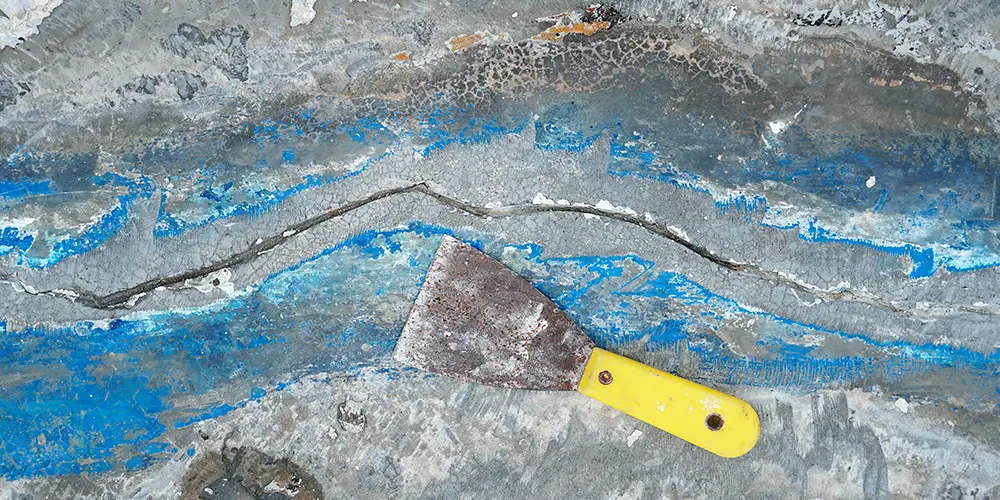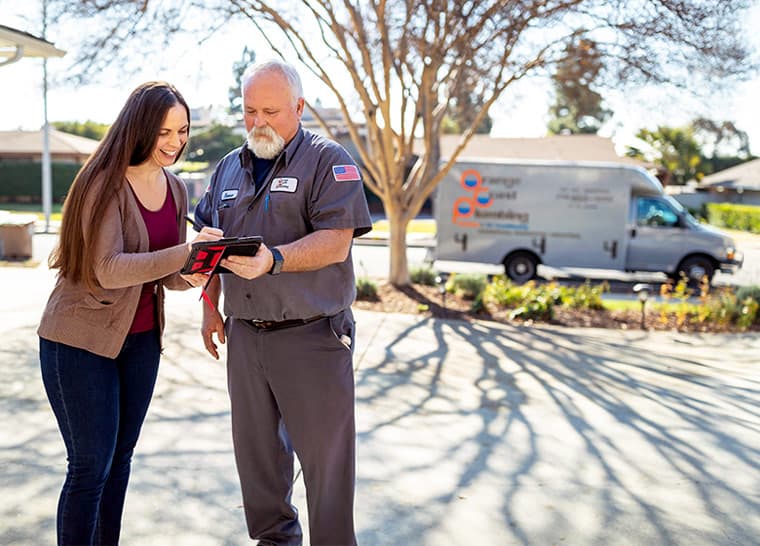A slab leak is the Chernobyl of plumbing disasters.
Not at first, but undetected, the leak grows and spreads, sometimes slowly and at other times in a burst. Untold damage ensues.
That biblical flood in your living room? It points to a slab leak.
The runaway mold growth in the den? A slab leak is suspect #1.
What Is a Slab Leak?
A slab leak is a water pipe leak in or under your home’s concrete foundation. It can be a pinhole leak in an old copper pipe or a full-on break due to shifting foundations.
All slab leaks have these things in common:
- A location in or under a concrete foundation.
- Difficulty to detect.
- Destructiveness. Left unchecked, they always lead to costly repairs.
So, the trick is to catch a slab leak early before it undermines your foundation and turns your home into a petri dish for mold.
In this blog, we’ll discuss some telltale signs of a slab leak that should put you on high alert. Call your plumber immediately for tests if you notice one or more of these symptoms:
1. Damp Spots Around Your Foundation
Sometimes, water in a slab leak finds its way outside and leaves damp spots that look like rain runoff, even when it hasn’t rained.
This usually indicates a sizable slab leak. If water is noticeable on the ground and the soil around your foundation is saturated, you have a significant problem. The more water you see outside, the larger the leak.
2. Buckling or Warped Floorboards & Walls
Your floorboards may warp or buckle; drywall near the affected area may also buckle.
Bad news! This means a slow slab leak has been at work for some time. It has saturated the drywall, allowing a mold colony to plant its flag. Get help fast, or you’ll have an extensive and expensive repair!
3. Damp Carpet & Floor
A slow, persistent slab leak can lead to damp carpet and flooring. The dampness will be consistent over time.
The worst-case scenario? You may have a flooding incident on your hands anywhere from a few days to weeks after noticing the slab leak symptoms. That’s why it’s crucial to spot these signs early and call for help as soon as possible!
4. Warm Areas on the Floor
If you detect one or more spots consistently warmer than the rest of the room, you may have a hot water slab leak.
5. Inexplicably High Water Bills
Unexpectedly high water bills suggest a slab leak (or another leak in your water system). You may see an increase in your bills without any corresponding increase in usage.
6. Low Water Pressure
A sudden drop in water pressure signals a slab leak somewhere nearby, but it may not be under the house. It might also be a pipe inside a wall or even below the yard.
7. Constant Sound of Running Water
You may hear running water even when all faucets are off, and no one uses water anywhere in the house. This sound comes from a leak in the system, releasing gallons of H2O!
It may not be a slab leak, but it bears investigation — even if it turns out to be the aquarium.
8. Foundation Cracks
Moving a slab and creating cracks in the foundation or walls takes a lot of pressure. That pressure comes from water buildup finding its way through those tiny crevices.
Water carved the Grand Canyon. It should have no trouble at all putting a crack or two in your foundation.
9. Foul Odors
A pungent smell indicates mold growth, so it’s time for an inspection! Mold colonies love moist environments created by slab leaks and spread fast. Mold repairs are time-consuming, invasive, and expensive.
10. Visible Water Spraying
In extreme cases, you may see water spraying up from the foundation or yard due to a major pipe break. Get help fast! The dog may love it, but the longer you wait, the more damage will occur.
What to Do If You Suspect A Slab Leak
Plumbers can pinpoint a slab leak with specialized diagnostic equipment, including pressure sensors, acoustic listening devices, and video inspections.
Also, have your plumber check for other plumbing problems that can cause the same slab leak symptoms. A water heater leak or clogged sewer line can mimic a slab leak in some ways.
The earlier you catch and fix a slab leak, the less costly it will be! Don’t wait if something seems wrong. Call your plumber today to find out for sure!
FAQs: Signs of a Slab Leak
Q: How do I know if my house has a slab leak?
Look for dampness, mold growth, unusual water pressure changes, or hot spots on the floor. If you see any of these signs, call a plumber immediately to have your home inspected.
Q: Can a slab leak damage a home’s foundation?
A slab leak can erode the soil underneath your foundation, causing it to shift or crack. If left untreated, this can lead to costly repairs.
Q: What should I do if I suspect a slab leak in my home?
Contact a professional plumber as soon as possible to conduct tests and locate the source of the potential slab leak.
Q: What causes slab leaks?
Slab leaks result from various factors, including pipe corrosion, ground movement, poor installation, and high water pressure. Identifying the cause is crucial for effective repair.
Q: How can I prevent a slab leak?
Ensure proper maintenance of plumbing systems, regularly check for signs of wear on pipes, and monitor water pressure to prevent undue stress on pipes.
Q: Does the homeowner’s insurance cover slab leaks?
Coverage depends on the policy and the cause of the leak. Review your insurance policy or consult with your insurance provider for details.
Q: How long does it take to repair a slab leak?
That varies according to the leak’s severity and location. Minor repairs may be completed in a few hours, while significant leaks can take several days.
Q: What is the average cost to repair a slab leak?
Repair costs depend on the extent of damage, the required repair method, and geographical location. You should expect costs to range from a few hundred to several thousand dollars.
Q: Can I fix a slab leak myself?
No. Slab leaks require specialized tools and expertise. Always hire a professional plumber.
Q: What are the long-term effects of ignoring a slab leak?
Neglecting a slab leak can lead to severe structural damage, mold growth, and extensive repairs. Always call a plumber without delay.


